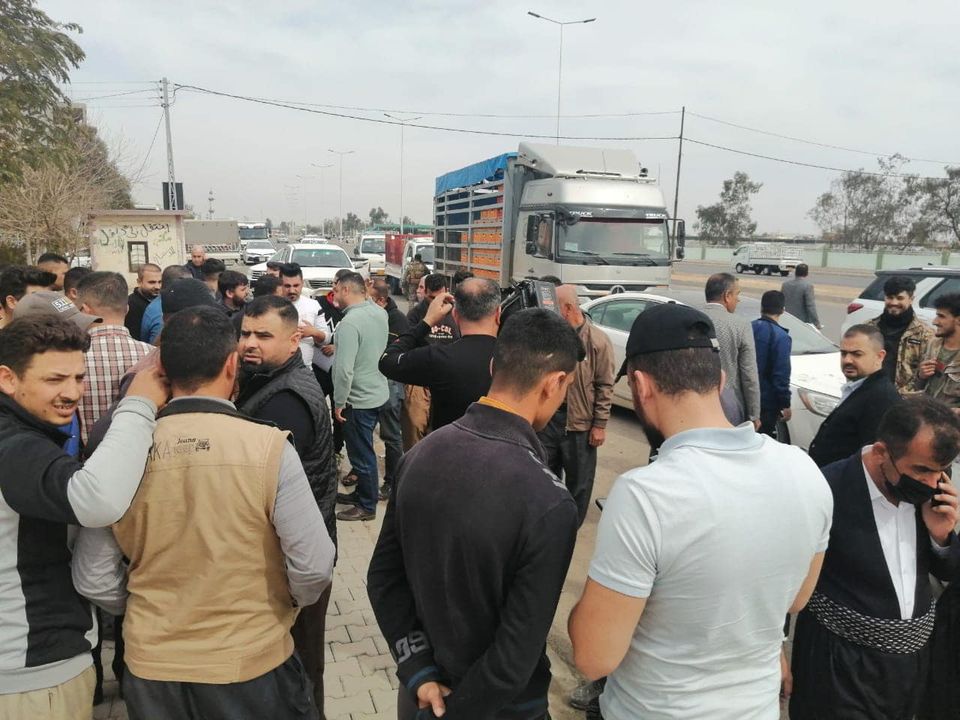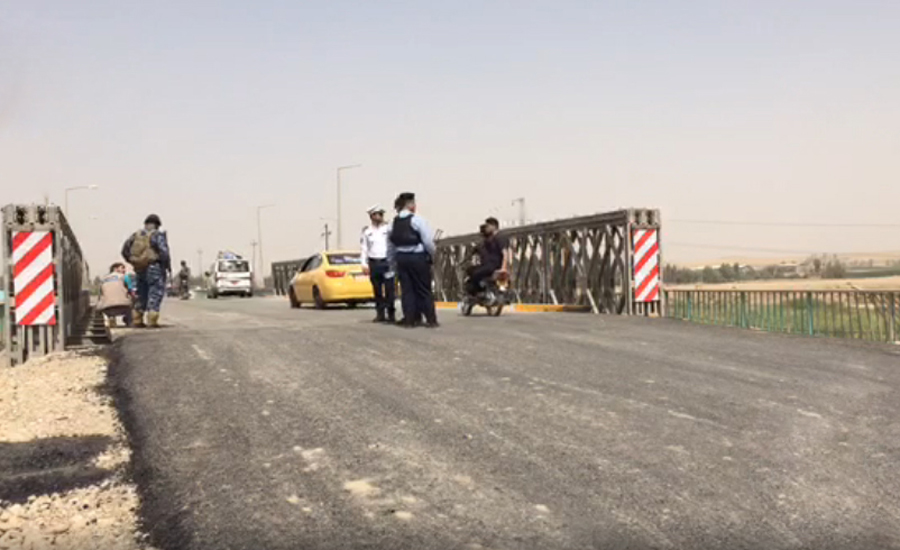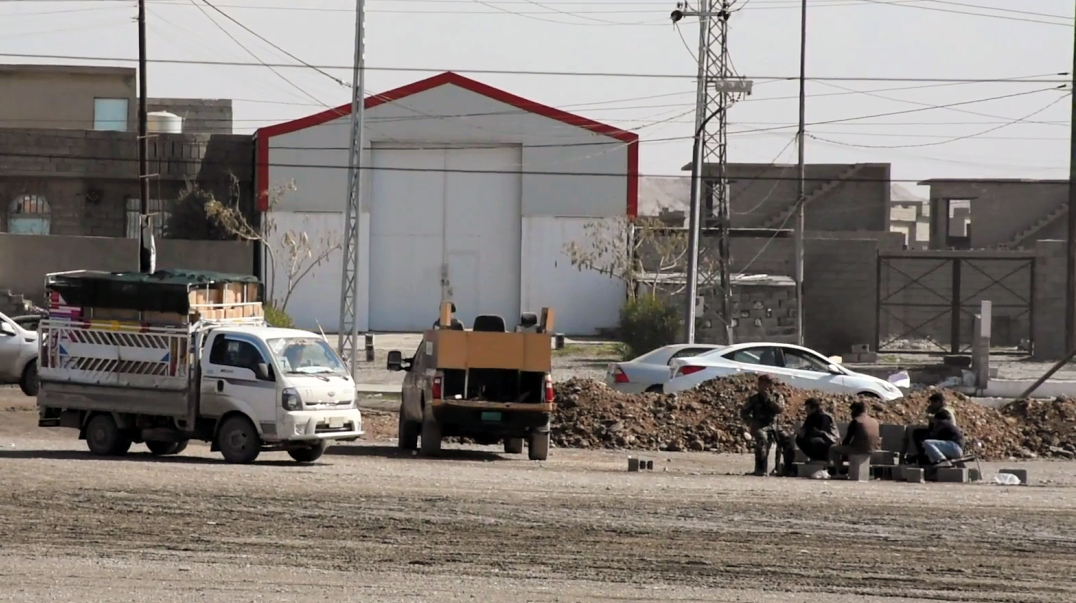At the main security checkpoints at the entrances into Kirkuk, "royalties" are taken from drivers of vehicles loaded with foodstuffs and other goods "randomly without official receipts", although these goods were previously subject to customs duties, yet some of it are included in the prohibited goods list that are imported illegally.
Many Kirkuk traders confirmed these charges to KirkukNow while the security authorities and those in charge of the checkpoints strongly deny the allegations.
The issue is debated after a protest gathering organized by a number of Kirkuk poultry farmers who gathered on Wednesday, March 2, 2022, in front of the Kirkuk Agriculture Directorate building for the second time in a week, calling for an end to the harassment they are subjected to in the checkpoints.
“At the checkpoints, they ask us to pay bribes and royalties in public, in order to allow us to bring poultry into the city center,” said Muhammad Nizam, owner of a poultry farm in Kirkuk and one of the participants in the protest pointing out that they hold official permits from Kirkuk administration to allow them to market their products inside the city of Kirkuk.
Owners of poultry farms on the outskirts of Kirkuk are seeking to market their production of chicken and eggs within the city, yet they face obstacles as some are trying to transport imported poultry and egg shipments from the provinces of Sulaymaniyah, Erbil and other cities to Kirkuk.
The Iraqi ministry of agriculture has banned import of chicken and egg and the ban includes Iraqi Kurdistan Region IKR since the Iraqi government in Baghdad has no control over border points in the IKR.
Taher Saleh, a wholesale trader of chicken from poultry fields, said, "We are forced to raise the price of chicken because of the obstacles we face at the checkpoints, and the affected in this case is the citizen."
According to Kirkuk Now follow-up, chicken prices in Kirkuk are relatively stable, with the price of one kilogram ranging between 2,900-3,000 Iraqi dinars ($2).
We have to pay sums ranging from 500-700 dollars to those in charge of the checkpoints
Khaled Muheddin, director of the Veterinary Teaching Hospital in Kirkuk, said there is a decision by the Ministry of Agriculture to ban the import of eggs and chickens from the governorates of the Kurdistan Region to Kirkuk, and the decision is still in force, so all those banned products are prohibited at the checkpoints between Kirkuk, Sulaymaniyah and Erbil.
Traders affirmed that "various amounts of money" are taken from vehicle drivers at the checkpoints at the entrances to Kirkuk from both Sulaymaniyah and Erbil in exchange for allowing the passage of goods and merchandise, including chicken and eggs.
"We have to pay sums ranging from 500-700 dollars to those in charge of the (security) checkpoints in exchange for allowing a shipment to pass, despite the fact that our poultry field is located in the Laylan sub-district of the Kirkuk, meaning that the import ban does not include it, and we should be able to transport it into the city without problems," explained Muhammad Jalal, owner of a poultry farm in Kirkuk.
“If we want to transport shipments of chickens and eggs from Laylan (19 km east of Kirkuk) into the city, we must pay a royalty,” he complained.

Kirkuk, March 2022: a gathering of owners of a number of poultry farms to protest against smuggling banned products products through checkpoints. KirkukNow
According to KirkukNow follow-up, this problem does not only face poultry farmers, but some traders of electrical appliances and other goods complain about the treatment they receive at the checkpoints.
Ali Darwish, a trader of household electrical appliances, says, "Although we have all the customs receipts and import documents to allow our shipments to pass, the checkpoints stop us and force us to pay an amount of money ranging from $300-$500.”
"If we refuse to pay the amount they're asking for, then they'll take some equipment for themselves."
Another trader who imports children's toys and bicycles anonymously said, "We have imported a shipment of bicycles from Basra (port). At the checkpoint between Daquq and Taza, south of Kirkuk, they asked the driver to pay $500 saying import of bicycles is prohibited."
The people who talked about the issue of taking "bribes and kickbacks" at the checkpoints pointed out that they are not given receipts to prove that they paid that amount.
A security source in Kirkuk anonymously said, “anyone accuses the security checkpoints of taking bribes and kickbacks, can provide evidence to the Joint Operations Command in Kirkuk, which will in turn follow up the case."
Checkpoints in Kirkuk are under the authority of the Joint Operations Command.
The security source, who asked not to be named, said, "There are strict instructions from the government to prevent the import of chickens and eggs from the neighboring provinces of Kirkuk, including Erbil and Sulaymaniyah, and the same measures are taken in Nineveh to prevent smuggling operations."
The source explained that these instructions are being implemented at Altun Kopri (Pirdy) checkpoint on the Erbil road, and the Qarahnajir checkpoint on the Sulaymaniyah road.
Some of the poultry farmers in Kirkuk appreciate the decision to ban the import of eggs and chickens from other governorates, provided that the ban does not include the transfer of the product of poultry fields located at the outskirts of the province to the center of Kirkuk.
Muhammad Ahmed, the owner of a poultry field in Kirkuk said, "There are 400 poultry fields in the province that provide job opportunities for hundreds of Kirkuk's citizens...but what hinders us is the smuggling of poultry products from the Kurdistan Region, which greatly affects local production."
Ahmed assured that the production of poultry fields in Kirkuk meets the needs of the local market.
There are more than 400 poultry farms in Kirkuk located in Laylan, Shiwan, Hawija and other districts and sub-districts of Kirkuk.
There is a large-scale smuggling of goods from the Kurdistan Region
The director of the veterinary teaching hospital in Kirkuk called on the concerned authorities to provide facilities for transporting poultry products to people hold permits proving their fields are located in the Kirkuk governorate.
“There are shipments of Kirkuk’s poultry fields production stopped at the Darman checkpoint in Altun Kupri district, not allowed to enter the city of Kirkuk,” Muheddin said.
This comes while an informed source on the condition of anonymity confirmed to KirkukNow that, "there is a large-scale smuggling of goods from the Kurdistan Region through Pirdy, where large numbers of chickens and livestock are entered under the cover that they belong to the people of Pirdy, while in fact they are imported from other countries to the region and from there to Kirkuk and other governorates of Iraq.
“More than two thousand sheep and cows were brought into Pirdy in just one night."
Those banned items on the list are smuggled into Kirkuk and from there to Baghdad and southern provinces.
There are more than five main entrances between Kirkuk and each of Sulaymaniyah, Erbil, Nineveh and Salahaddin provinces.

Kirkuk, 2018: A checkpoint in Altun Kupri (Pirdy) on Erbil-Kirkuk highway. KirkukNow
Zuhair Ali, Director of Kirkuk Agriculture, said, "We have received protests from the owners of poultry fields, but the instructions of the Ministry of Agriculture stress the need to protect local production and ban imports, so we will try to remove obstacles to the transportation of poultry farm products in the province."
Charities and non-governmental organizations NGOs were also not spared the obstacles at the checkpoints.
A member of a non-profit organization, who asked not to be named, told (KirkukNow), "In the middle of January of this year, we were transporting three vehicles carrying foodstuffs, blankets and heaters from Baghdad to Arbat camp (for IDPs in Sulaymaniyah) for the displaced in Sulaymaniyah, but they intercepted us at Taza checkpoint.”
“They asked us to pay the sum of eight million dinars ($6,000), on the pretext that the blankets did not have a customs entry book, so they confiscated nearly 300 blankets, despite the fact that their customs duties were paid while importing them to Iraq at the port of Umm Qasr in Basra.”
Kirkuk Chamber of Commerce asked all traders and its members to refrain paying bribes and kickbacks to the checkpoints.
Omar Mamo, deputy director of the Kirkuk Chamber of Commerce, told KirkukNow, "The amount taken from them under the name of the customs tariff is not legal, because the customs duties for these goods were collected while entering the Kurdistan Region through the border crossings."
The Kirkuk Chamber of Commerce met last week with the local administration of Kirkuk and the Joint Operations Command, and suggested, according to Mamo, that a representative of the comer e chamber and the security services jointly handle the transactions of entering goods and merchandise, given that they have a list of goods prohibited from being imported and issued by the Ministries of Commerce and Agriculture and the proposal is awaiting approval.





